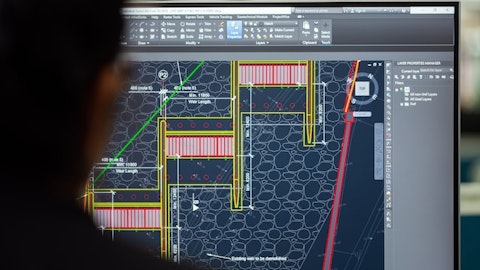So that doesn’t concern me at all. But in terms of the revenue, you just don’t know for sure until you get in there and start working it. And you don’t really know the gross margin until you get in there and start working it as well, but we believe that the schools that we’re going to be adding should all have pretty similar margin profiles to what we have right now. And we don’t see that. Sometimes you might need to put a few people in there at a little bit lower margin to really impress them and get the contract rolling. But we’re not typically — right now, we’re not really seeing a lot of headwinds as far as the margins are concerned for schools.
Alex Rygiel: And then more broadly across all three of your business segments. Are there any other kind of sizable contracts that are nearing conclusion or who are contemplating or have recently sort of walked away from that they’re worth discussing?
Kevin Miller: Well, there is a large healthcare client that Brad mentioned, that’s a long-term care facility that is mostly funded by Medicaid that just is really slow paying. We always get paid by them. They’re 20 plus your client, we’ve never had a write-off. But it just doesn’t make sense to service them at the level that we were servicing them in 2022 and 2023, because of the — because we just don’t want that much capital tied up in one client. It’s not really a risk in terms of payment, but it’s just a pure capital allocation decision that Brad and I decided we got to sort of slow this down a little bit. And it hurts in the short term, but it’s the right decision, long-term. But as far as major contracts, I mean, we don’t really talk too much about that, because we just don’t want to talk about a big contract.
We think we’re going to win and then not win it. But the pipeline in the backlog is strong across all the divisions. And Brad, I don’t know if you want to add something to that.
Brad Vizi: Yes. Alex, to put a fine point on it, I think that there’s always going to be some of our project orientation to the business, but with respect to potential headwinds of projects, basically kind of ending. There’s nothing really on the horizon that we’re aware of that. We’re not, we don’t think we’re going to grow right through. Just the biggest headwind as, as we mentioned, Kevin reaffirmed it was in healthcare and we think we’re going to be largely through that at the end of this quarter.
Alex Rygiel: And I’m going to end with the capital allocation question here. Clearly, your cash flow outlook is very positive, balance sheets really strong. Didn’t believe you bought any shares back in the quarter, but can you talk about how you’re thinking about prioritizing buybacks versus acquisitions?
Brad Vizi: Yes. Just to be clear on that, Alex, and you’ll see when the Q is filed here, we bought a couple hundred thousand shares in the quarter.
Alex Rygiel: In Q2.
Brad Vizi: Yes. And look, as the cash starts to come in here over the next couple quarters, we should pretty much be due levered at that point or getting really close to it. And look, we’re going to be opportunistic and we’re just finding comfortable carrying around a little bit of cash for a period of time. And when the right opportunity presents itself, that means our return profile we’re going to be quick to move. That being said, we are looking at a couple of bolt-ons. We were very intrigued by that we think that we can add significant value to and the chemistry is certainly right with the sellers. So, when they fit that profile with respect to a technical capability and a very attractive growing segment of the market, that we can put RAF behind in terms of sales horsepower, recruiting horsepower, right, and everything else that comes with the platform. So, we’re a little closer there, but, perhaps there’s more to talk about in August on one of those.
Alex Rygiel: That’s great. Thank you very much. Nice quarter.
Brad Vizi: Thank you.
Operator: I’m so sorry. I was on mute there. [Operator Instructions] The next up, we have Ben Andrews.
Ben Andrews: Hey, good afternoon.
Brad Vizi: Hi, Ben.
Ben Andrews : Two questions, please. When I look at the healthcare year-over-year, it looks like a gross margin went down a little bit. So, the accounts that you’re calling that are slow paying, they’re also high margin business?
Kevin Miller: No, they’re right around the normal margin. The main reason for the downturn in the margin, frankly, was we had a pretty big increase to some of our employment taxes in New York. That’s sort of the biggest hit that we took in Q1. We had a pretty big increase. That will run through. And then you just have normal noise and mix shift in the margin that you’re going to see. But there’s nothing other than that issue in Q1 that I would say is impacting the year-over-year comparison. And keep in mind that Q1 of last year was pretty high margin compared to historic margins.
Ben Andrews : Okay. And then this might be intertwined with that question as well, but regarding accounts receivable, for a long time now, many years, it seems that you guys get it together and then it spins out of control. Then you get it together and then it spins out of control. Is that indicative of that client or is that indicative of the revenue split on the type of clients you have? Why is that?
Kevin Miller: Yes, I think that’s where I can explain it, Ben, is there’s just — particularly in the schools, we do run into some administrative issues from time to time, especially with our biggest clients. And we’ve had a lot of quarters in a row excluding the last couple where we had outstanding DSOs for those two clients. And we’ll get it back to a better level. And then there’s always going to be noise in terms of some of the clients that you’re working with, in terms of, especially on the project side, right? Because a lot of times you can’t get paid until the project’s finished, there’s certain milestones built in. So there’s always going to be some fluctuations in terms of the AR. I think that if you look — if you sort of looked at this company over like a 12-year period, we don’t have some of the issues that we’ve had in the prior years in terms of like some of the — I don’t want to use the word systemic, but there is — we had some issues where we just were not as diligent and not as really focused on AR as we should be, to be really honest.




